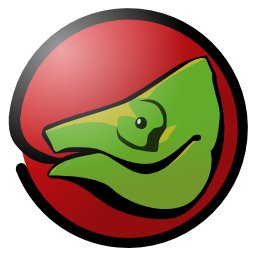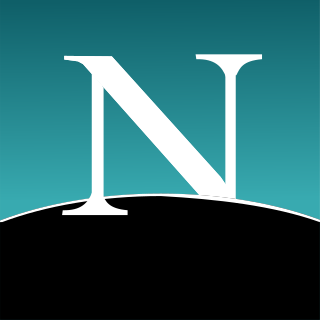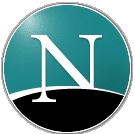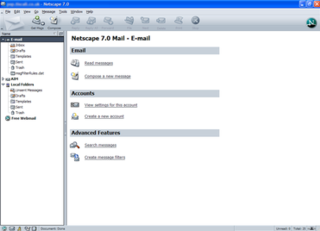
K-Meleon is a free and open-source, lightweight web browser for Microsoft Windows. It uses the native Windows API to create its user interface. Early versions of K-Meleon rendered web pages with Gecko, Mozilla's browser layout engine, which Mozilla's browser Firefox and its email client Thunderbird also use. K-Meleon became a popular Windows browser and was available as an optional default browser in Europe via BrowserChoice.eu. K-Meleon continued to use Gecko for several years after Mozilla deprecated embedding it. Current versions of K-Meleon use the Goanna layout engine, a fork of Gecko created for the browser Pale Moon.

Netscape Navigator is a discontinued proprietary web browser, and the original browser of the Netscape line, from versions 1 to 4.08, and 9.x. It was the flagship product of the Netscape Communications Corporation and was the dominant web browser in terms of usage share in the 1990s, but by around 2003 its user base had all but disappeared. This was partly because the Netscape Corporation did not sustain Netscape Navigator's technical innovation in the late 1990s.
Netscape Communications Corporation was an American independent computer services company with headquarters in Mountain View, California, and then Dulles, Virginia. Its Netscape web browser was once dominant but lost to Internet Explorer and other competitors in the first browser war, with its market share falling from more than 90 percent in the mid-1990s to less than one percent in 2006. An early Netscape employee, Brendan Eich, created the JavaScript programming language, the most widely used language for client-side scripting of web pages. A founding engineer of Netscape, Lou Montulli, created HTTP cookies. The company also developed SSL which was used for securing online communications before its successor TLS took over.
Gecko is a browser engine developed by Mozilla. It is used in the Firefox browser, the Thunderbird email client, and many other projects.

Beonex Communicator is a discontinued open-source Internet suite based on the Mozilla Application Suite (MAS) by Ben Bucksch, a German Mozilla developer. It was intended to have a higher security and privacy level than other commercial products. The Internet suite contains a Web browser, an email and news client, an HTML editor and an IRC client.

Netscape Communicator is a discontinued Internet suite produced by Netscape Communications Corporation, and was the fourth major release in the Netscape line of browsers. It was first in beta in 1996 and was released in June 1997. Netscape Communicator addressed the problem of Netscape Navigator 3.x being used as both the name of the suite and the browser contained within it by renaming the suite to Netscape Communicator. It included more groupware features intended to appeal to enterprises.
XUL, which stands for XML User Interface Language, is a user interface markup language developed by Mozilla. XUL is an XML dialect for writing graphical user interfaces, enabling developers to write user interface elements in a manner similar to web pages.
The Book of Mozilla is a computer Easter egg found in the Netscape, Mozilla, SeaMonkey, Waterfox and Firefox series of web browsers. It is viewed by directing the browser to about:mozilla.
The Mozilla Public License (MPL) is a free and open-source weak copyleft license for most Mozilla Foundation software such as Firefox and Thunderbird. The MPL license is developed and maintained by Mozilla, which seeks to balance the concerns of both open-source and proprietary developers. It is distinguished from others as a middle ground between the permissive software BSD-style licenses and the GNU General Public License. As such, it allows the integration of MPL-licensed code into proprietary codebases, as long as the MPL-licensed components remain accessible under the terms of the MPL.
This is a comparison of both historical and current web browsers based on developer, engine, platform(s), releases, license, and cost.

Netscape Browser is the eighth major release of the Netscape series of web browsers, now all discontinued. It was published by AOL, but developed by Mercurial Communications, and originally released for Windows on May 19, 2005.

SeaMonkey is a free and open-source Internet suite. It is the continuation of the former Mozilla Application Suite, based on the same source code, which itself grew out of Netscape Communicator and formed the base of Netscape 6 and Netscape 7.

Netscape 7 is a discontinued Internet suite developed by Netscape Communications Corporation, and was the seventh major release of the Netscape series of browsers. It is the successor of Netscape 6, and was developed in-house by AOL. It was released on August 29, 2002 and is based on Mozilla Application Suite 1.0.
The history of the Mozilla Application Suite began with the release of the source code of the Netscape suite as an open source project. Going through years of hard work, Mozilla 1.0 was eventually released on June 5, 2002. Its backend code base, most notably the Gecko layout engine, has become the foundation of a number of applications based on Mozilla, including the Mozilla Foundation's flagship product Mozilla Firefox and Mozilla Thunderbird. While the suite is no longer a formal Mozilla product, its development and maintenance is continued as the SeaMonkey community project.

The Mozilla Application Suite is a discontinued cross-platform integrated Internet suite. Its development was initiated by Netscape Communications Corporation, before their acquisition by AOL. It was based on the source code of Netscape Communicator. The development was spearheaded by the Mozilla Organization from 1998 to 2003, and by the Mozilla Foundation from 2003 to 2006.

The Netscape web browser is the general name for a series of web browsers formerly produced by Netscape Communications Corporation, which eventually became a subsidiary of AOL. The original browser was once the dominant browser in terms of usage share, but as a result of the first browser war, it lost virtually all of its share to Internet Explorer due to Microsoft's anti-competitive bundling of Internet Explorer with Windows.

Netscape Composer is a WYSIWYG HTML editor initially developed by Netscape Communications Corporation in 1997, and packaged as part of the Netscape Communicator, Netscape 6 and Netscape 7 range of Internet suites. In addition, Composer can also view and edit HTML code, preview pages in Netscape Navigator, check spelling, publish websites, and supports most major types of formatting.

Netscape Mail and Newsgroups, commonly known as just Netscape Mail, was an email and news client produced by Netscape Communications Corporation as part of the Netscape series of suites between versions 2.0 to 7.2. In the 2.x and 3.x series, it was bundled with the web browser. In the 4.x series, it was rewritten as two separate programs known as Netscape Messenger and Netscape Collabra.
Mozilla is a free software community founded in 1998 by members of Netscape. The Mozilla community uses, develops, publishes and supports Mozilla products, thereby promoting exclusively free software and open standards, with only minor exceptions. The community is supported institutionally by the non-profit Mozilla Foundation and its tax-paying subsidiary, the Mozilla Corporation.







